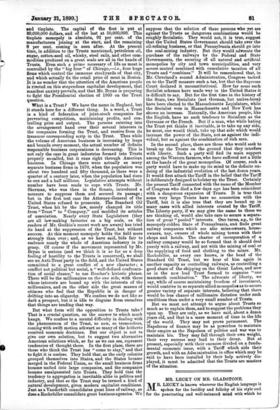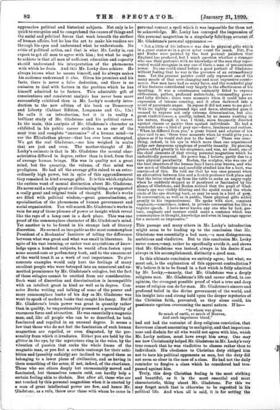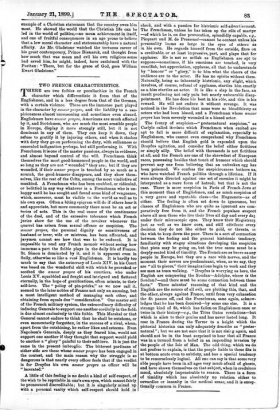MR LECKY ON MR. GLADSTONE.
MR. LECKY is known wherever the English language is spoken for the lucidity and felicity of his style and for the penetrating and well-balanced mind with which he approaches political and historical subjects. Not only is he quick to recognise and to comprehend the causes of things and the social and political forces that work beneath the surface of human affairs, but be has the art to make his readers see through his eyes and understand what he understands. No critic of political action, and that is what Mr. Lecky is, can expect to get all men to agree with him ; but what he ought to achieve is that all men of sufficient education and capacity should understand his interpretation of the phenomena with which be deals. And this Mr. Lecky does achieve. He always knows what he means himself, and he always makes his audience understand it also. Given his premises and his facto, there is never a false deduction, and there is no omission to deal with factors in the problem which he has himself admitted to be factors. This admirable gift of conscientious and consistent analysis has never been more successfully exhibited than in Mr. Lecky's masterly intro- duction to the new edition of his book on Democracy and Liberty (Cabinet Edition, Longmans and Co., 129.) He calls it an introduction, but it is in reality a brilliant study of Mr. Gladstone and his political career. In the main, this analysis of Mr. Gladstone's character as exhibited in his public career strikes us as one of the most true and complete "anatomies" of a human mind—to use the Elizabethan phrase—that has ever been attempted. NVe get the real Gladstone,—see him weighed in scales that are just and even. The mother-thought of Mr. Lecky's estimate is that in Mr. Gladstone the mental char- acteristics differed in degree, rather than in kind, from that of average human beings. His was in quality not a great mind, but the quantity, the volume, of that mind was prodigious. He had all the average gifts raised to an extra- ordinarily high power, but in spite of this aggrandisement they remained in kind average gifts. It is this which explains the curious want of mental distinction about Mr. Gladstone. He never said a really great or illuminating thing, or suggested a really great and original train of thought. Burke's works are filled with political wisdom,—great generalisations, or specialisation of the phenomena of human government and social organisation. You will search Mr. Gladstone's works in vain for any of those phrases of power or insight which reveal like the rays of a lamp cast in a dark place. This was one proof of the commonplace character of Mr. Gladstone's mind. Yet another is to be found in his strange lack of literary discretion. He seemed as incapable as the most commonplace President of a Mechanics' Institute of telling the difference between what was great and what was small in literature. In spite of his vast learning, or rather vast acquisitions of know- ledge upon a hundred subjects, be would often fasten upon some second-rate or perfunctory book, and to the amazement of the world treat it as a work of real importance. To give concrete examples would only hurt the feelings of many excellent people who were betrayed into an unnatural and un- merited prominence by Mr. Gladstone's eulogies, but the fact of those eulogies cannot be omitted from our consideration. Such want of discretion and discrimination is incompatible with an intellect great in kind as well as in degree. Con- ceive Burke writing and talking of some of the poorer and more commonplace books of his day as Mr. Gladstone was wont to speak of modern books that caught his fancy. But if Mr. Gladstone's brain power was great in quantity rather than in quality, he unquestionably possessed a personality of enormous force and attraction. He was essentially a magnetic man, and, like all people who can be so described, he both fascinated and repelled in an unusual degree. It seems a law that those who do not feel the fascination of such human magnetism are repelled, or even disgusted, by the per. sonality from which it irradiates. Either you are held by the glitter in the eye, by the mysterious ring in the voice, by the vibration of passion that rocks the whole frame of the magnetic man, or you feel a certain contempt for their exhi- bition and (possibly unfairly) are inclined to regard them as belonging to a lower plane of civilisation, and as having in them something of the actor, if not, indeed, of the charlatan. Those who see others deeply but unreasonably moved and fascinated, but themselves remain cold, can hardly help a certain feeling akin to disdain. But after all, those who are not touched by this personal magnetism when it is exerted by a man of great intellectual power are few, and hence Mr. Gladstone, as a rule, threw over those with whom he came in
personal contact a spell which it was impossible for them not to acknowledge. Mr. Lecky has conveyed the impression of this personal magnetism in a singularly felicitou9 account of Mr. Gladstone's personal appearance :-
" Not a little of his influence was due to physical gifts which in a great orator as in a groat actor count for much. Pitt, Fox
and Burke were painted by the best portrait painters that England has produced, but 1 much question whether a stranger who saw their portraits with no knowledge of the men they repre- sented would recognise in any one of them a man of pre-eminent power. No one could stand before a good portrait of Gladstone without feeling that he was in the presence of an extraordinary
man. Yet the greatest painter could only represent one of the many moods of that ever-changing and most expressive counte- nance. Few men have bad so many faces, and the wonderful play of his features contributed very largely to the effectiveness of his speaking. It was a countenance eminently fitted to express enthusiasm, pathos, profound melancholy, commanding power and lofty disdain ; there were moments when it could take an expression of intense cunning, and it often darkened into a scowl of passionate anger. In repose it did not seem to me good. With its tightly compressed lips and fierce, abstracted gaze it seemed to express not only extreme determination, but also great vindictiveness, a quality, indeed, by no means wanting in his nature, though it was, I think, more frequently directed against classes or parties than against individuals. He had a wonderful eye—a bird of prey eye—fierce, luminous and restless. ' When he differed from you,' a great friend and admirer of his once said to me. 'there were moments when he would give you a glance as if he would stab you to the heart.' There was some • thing, indeed, in his eye in which more than one experienced judge saw dangerous symptoms of possible insanity. Its piercing glance added greatly to his eloquence, and was, no doubt, one of the chief elements of that strong personal magnetism which he undoubtedly possessed. Its power was, I believe, partly due to a rare physical peculiarity. Boehm, the sculptor, who was one of the best observers of the human face I have ever known, and who saw much of Gladstone and carefully studied him for a bust, was convinced of this. He told me that he was once present when an altercation between him and a Scotch professor took place and that the latter started up from the table to make an angry reply when he suddenly stopped as if paralysed or fascinated by the glance of Gladstone, and Boehm noticed that the pupil of Glad- stone's eye was visibly dilating and the eyelid round the whole circle of the eye drawing back, as may be seen in a bird of prey. In conversation, as well as in public, these physical gifts added greatly to his impressiveness. He spoke with slow, constant emphasis,—sometimes, indeed, in private conversation too like a regular speech. I have never known any one who by look, ges- ture, emphasis and manner could make a sentence which was commonplace in thought, knowledge and even in language appear for a moment so impressive."
This passage and many others in Mr. Lecky's introduction might seem to be leading up to the conclusion that Mr. Gladstone was essentially a bad man,—a man disingenuous, ambitious and vindictive. Bnt to this conclusion Mr. Lecky never comes,—nay, rather he specifically avoids it, and shows that Mr. Gladstone was instead, always in his desire if not always in his accomplishment, distinctly a good man.
In this ultimate conclusion we entirely agree; but what, we must ask, is the explanation of this apparent contradiction ? We believe it is to be found in a fact which is fully admitted by Mr. Lecky,—namely, that Mr. Gladstone was a deeply religions man. Mr. Gladstone's life and career afford, in our opinion, the strongest possible proof of what a true and deep sense of religion can do for man. Mr. Gladstone's sincere and profound belief in the divine government of the world, and his insight into and strong hold upon the deeper mysteries of the Christian faith, prevented, as they alone could, his passionate egotism overcoming the moral nature. If he— "to whom was given
So much of earth, so much of Heaven, And such impetuous blood,"
had not had the restraint of deep religions conviction, that fierceness almost amounting to malignity, and that imperious- ness and disdain for all who would not agree with him, which Mr. Lecky notices, must have swept him away. One may see how Christianity helped Mr. Gladstone in Mr. Lecky's very true remark that he was vindictive to classes rather than to individuals. His obedience to Christian duty obliged him not to hate his political opponents as men, but the duty did not seem so clear in the case of a class. He had not the daily reminder to forgive a class which he considered had tres- passed against him.
Truly, this deep Christian feeling is the most striking and beautiful, as it is the most essential and most characteristic, thing about Mr. Gladstone. For this we may forget much that is otherwise to be regretted in hie political life. And when all is said, it is for setting the
example of a Christian statesman that the country owes him most. He showed the world that the Christian life can be led in the world of politics,—no mean achievement in itself, and one of fruitful consequences in an age prone to believe that a low moral character and statesmanship have a natural affinity. As Mr. Gladstone watched the tortuous career of his great contemporary, Prince Bismarck, and thought from how much that was mean and evil his own religious sense had saved him, he might, indeed, have exclaimed with the Puritan : " There, but for the grace of God, goes William Ewart Gladstone."




































 Previous page
Previous page